
Truck and Bus Enforcement Operation
22 to 28 July
22 to 28 July
This
operation will see police officers carrying out a wide range of safety
inspections that focus on speeding, alcohol, drugs, seatbelt use,
tachograph infringements, excess weight, dangerous loading and document
offences.
In previous years, upwards of 30,000 offences have been detected during the seven days of the operation.
We
are committed to safer, more secure roads across Europe. We know that
the majority of truck drivers and operators take a pride in the quality
and safety of their work, and we strive to support them.
However,
there remains a proportion of less scrupulous operators, who put
profits first and who will cut safety corners in the process. It is
against these that our efforts are focused. We are also working to
ensure a more consistent enforcement of current laws governing large
goods vehicle safety.
Speed Enforcement Operation
12 to 18 August
12 to 18 August
During
this operation, officers will use a number of speed detection methods
across all types of road. The purpose of the operation is to raise
awareness of the dangers of speeding, and to remind drivers of the
benefits for all road users of driving at speeds that are both legal and
appropriate.
We
urge all drivers to challenge their own attitude to speeding. Anyone
who still believes that speeding is a trivial offence needs to think
again. That’s because excessive or
inappropriate speed has a singularly devastating impact on the safety of
road users, increasing both the risk of a crash and the severity of the
consequences.
It
is estimated that speeding contributes to as many as one third of all
crashes resulting in death, and is the most important contributory
factor to road deaths and serious injuries. Similar TISPOL operation in
previous years have seen more than 500,000 detections. But detecting
offending drivers is not the aim; the true measure of success for this
operation would be 100 per cent compliance with speed limits.
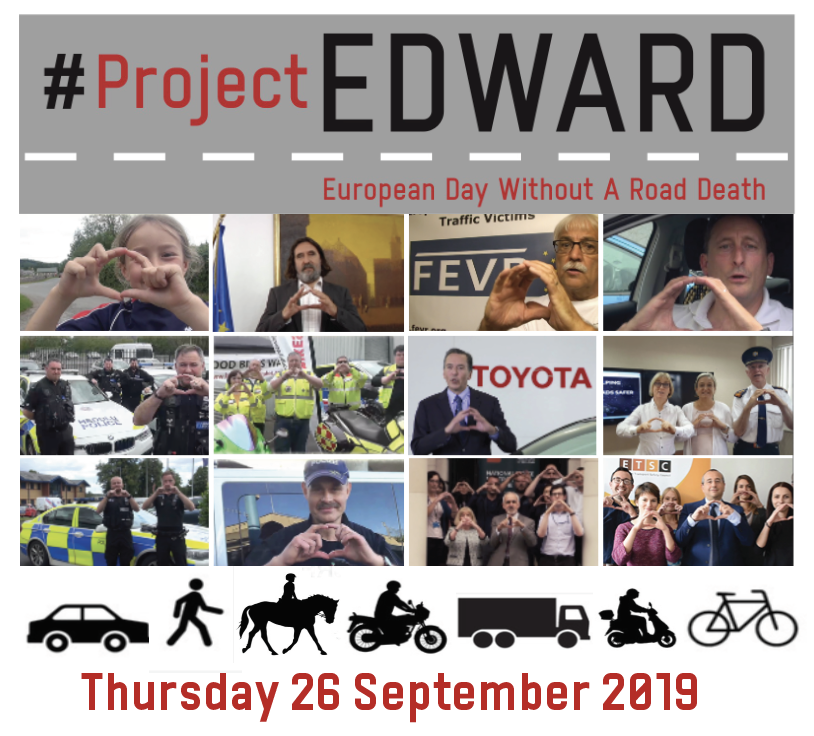
Project EDWARD videos: what does your zero look like?
We love this short video from Ireland -more than 5,000 views on Twitter in just a couple of days! Take a look!
Check
out these two videos we have recently posted in support of Project
EDWARD. If you would like to make and send us a short video, we will
ensure it gets posted on social media and shared as far and wide as
possible.
Updates from across Europe...
Germany: 2018 figures show three per cent rise in road fatalities
A
total of 3,275 people died in road accidents in Germany in 2018, 95
more than the previous year, according to Germany's Federal Statistics
Office. This 3% annual rise in road fatalities is the first increase
after two years of decline. A further 396,000 people were injured
in traffic accidents in 2018, an increase of 5,706 cases.
Overall, the number of road deaths fell by 10.2% between 2010 and 2018. Road deaths reached a 60-year low in 2017.
Passenger
car occupants accounted for 43.5% of all road deaths in Germany last
year, with 1,424 people killed in cars in 2018. A further 697 deaths
were people on motorcycles, and there were 174 fatalities of occupants
of goods road transport vehicles.
A
total of 458 pedestrians died in road accidents in 2018, while another
77 people died in other accidents, such as bus passengers (9) and people
using agricultural tractors (20).
Rural
roads accounted for 24.3% of all accidents, but these accounted for 57%
of all fatal accidents. Meanwhile, 6.7% of all accidents and 12.9% of
all fatal accidents occurred on motorways.
Croatia: Parliament agrees tougher laws for traffic violators
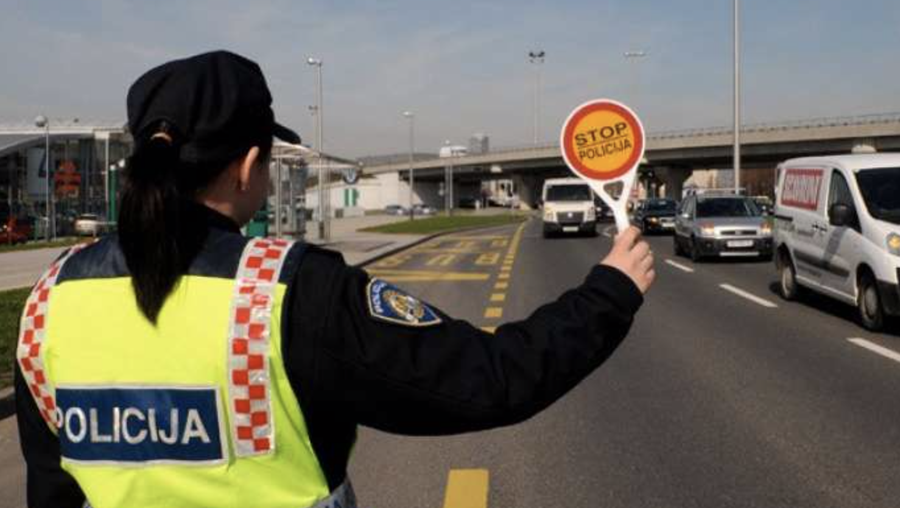
The
Croatian Parliament has agreed on amendments to the Law on Road Safety,
with harsher penalties for traffic offences. Eight of the gravest
offences will incur a fine of 15,000 kuna (€2025) and 20,000 kuna
(€2700) instead of 5,000 kuna (€675) and 10,000 kuna (€1350)
respectively as was the case until now.
These
fines apply to offences such as driving in the opposite direction on
motorways, exceeding the speed limit by more than 50 kph, deliberately
driving through a red light, refusing to take an alcohol or drug test or
driving under the influence, driving prior to obtaining or without a
licence that has been suspended
or revoked.
In
cases where a driver commits the same offence for the second time
within three years, their licence will be suspended for at least six
months and for the third and any following such offence, their licence
will be revoked for at least one year.
Lithuania: police gifts to drivers for obeying the law
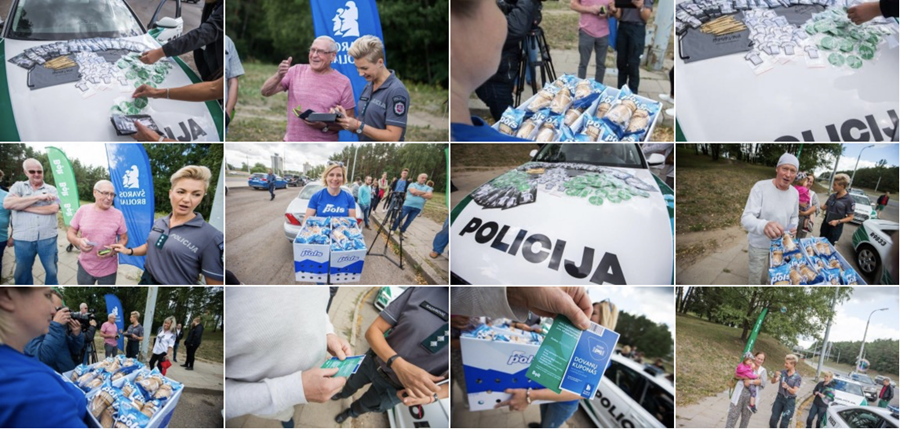
Lithuanian
police recently invited drivers to friendly “Clean driver” events in
Vilnius, Kaunas, and Klaipėda. Many drivers responded to the invitation,
filling up the majority of the parking spaces at the three locations. A
total of 150 drivers, who have not violated the Road Traffic Rules in
recent year, were awarded gifts and the title of “Clean driver”.
Drivers who participated were able to check their driving history, communicate with officers from the Lithuanian Police Department about problems or ask questions. Special gifts from “Švaros broliai” and “Bolt” were also awarded to drivers, who were responsible on the road and showed a good example to others. Every participant was treated with a 'Pols' ice cream.
Since September of last year, the start of the “Clean driver” initiative, there have been 10 events, with more than 1,300 people participating. Currently, the title of “Clean driver” has been awarded to 750 drivers. By putting the gifted sticker of the initiative on their car, the drivers make a commitment not only to continue being responsible on the road but also to encourage other road users to behave in the same way.
Drivers who participated were able to check their driving history, communicate with officers from the Lithuanian Police Department about problems or ask questions. Special gifts from “Švaros broliai” and “Bolt” were also awarded to drivers, who were responsible on the road and showed a good example to others. Every participant was treated with a 'Pols' ice cream.
Since September of last year, the start of the “Clean driver” initiative, there have been 10 events, with more than 1,300 people participating. Currently, the title of “Clean driver” has been awarded to 750 drivers. By putting the gifted sticker of the initiative on their car, the drivers make a commitment not only to continue being responsible on the road but also to encourage other road users to behave in the same way.
Cyprus: video promotes motorcycle safety
The
Cyprus Motorcycle Rights Club (CMRC) is using a drone video to raise
public awareness about road safety, particularly of motorbike and moped
riders. You have choices, it says as it urges road users not to make the
wrong one.
Bikers are among the most vulnerable road users in Cyprus, accounting for 10 of the 18 road fatalities so far this year.
Police
recently held a two-week road safety campaign targeting motorbikes and
mopeds, their third so far this year. Special emphasis was given to
dangerous driving,
failure to wear a helmet, breaking the speed limit and driving without a
driving licence. A sp[okesperson said that in the period of 2014 to
2018, more than half (52.05%) of the motorbike and moped riders killed
in road collisions were not wearing a helmet.
Watch the video >>
Denmark: arrests for drunk scooter riding
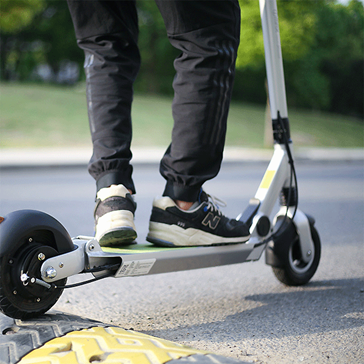
Danish
police have arrested 28 people in Copenhagen for riding electric
scooters while under the influence of drugs and alcohol. Over a recent
weekend, 24 people were caught drink-driving scooters while four were
intoxicated from recreational drugs.
The
force announced the arrests on Twitter following a crackdown on the
unsafe use of scooters in the Danish capital earlier this year.
Intoxicated drivers are liable for a 2,000 krone (€260) fine.
Electric scooters have seen a surge in popularity in Copenhagen since traffic rules were adapted to make them easier to use.
Finland: disturbingly high levels mobile phone use revealed in driver survey
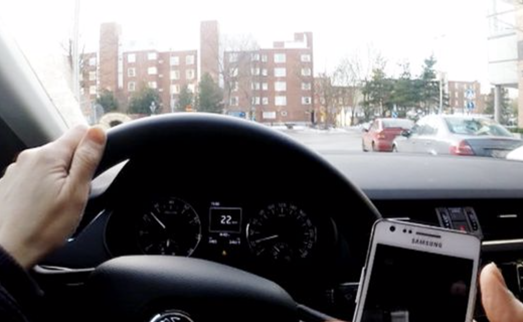
Half
of respondents admitted in a recent survey to using their phone 'at
least once' while driving without utiliing hands-free equipment. This
result put Finland at the top of the 20 European countries participating
in the survey in this area.
The so-called ESRA2 poll was the second round of an E-Survey of Road Users’ Attitudes (ESRA)
that asked respondents to report their behaviour, attitudes and
opinions about unsafe traffic practices and enforcement experiences.
"The Finns are recognised as being a
nation of mobile phone users, but using them on the road is risky. A
mobile phone is distracting, no matter whether you are a driver, cyclist
or pedestrian," says Juha Valtonen, a research director at the Finnish Road Safety Council.
To
assess self-declared behaviours in traffic, car drivers were asked the
question: "Over the last 30 days, how often did you as a car driver use a
hand-held mobile phone while driving?"
Just about half, 49.5 percent, answered "at least once" or more.
According
to the Finnish Road Safety Council, four out of five Finns consider
text messaging and social media related messaging while driving to be a
serious or very serious offence.
Netherlands: texting cyclists will now receive fines
It
is now illegal in the Netherlands to use your smartphone while cycling.
Those caught texting while in the saddle will face a fine of 95
euros. The goal of this ban is to increase traffic safety by decreasing
distractions.
The
ban also applies to using mobile devices while operating other types of
vehicles, such as cars, scooters, motorcycles, mobility scooters and
trams. Drivers caught texting while using a motorised vehicle face a
fine of 240 euros.
Distraction cause a large number of collisions on Dutch roads. According to
police calculations, people who text while they are driving have a 25 times higher risk of crashing.
And finally...
Our
congratulations go to TISPOL webmaster Neil Barrett, who has just won
the Stationers' Company 'Young Stationers Award' for Journalism and
Communication. The Stationers' Company is one of 110 livery companies in
London, founded in 1403.
Neil is pictured below, between Company Master Trevor Fenwick and Young Stationers Chairman Ella Kahn.
Well done!
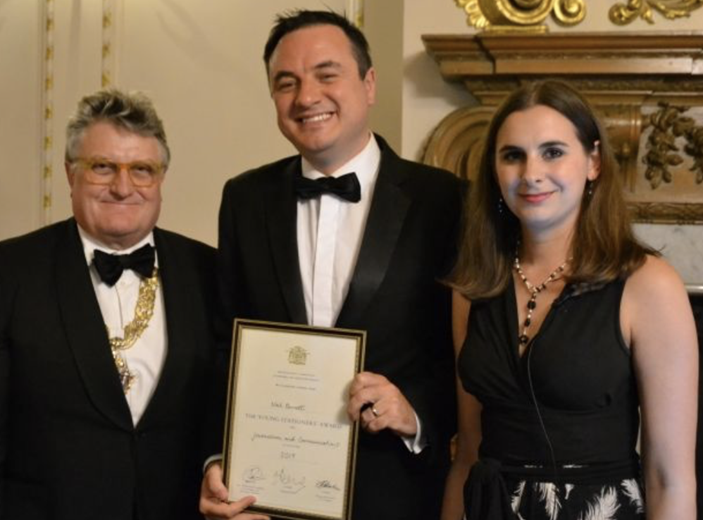



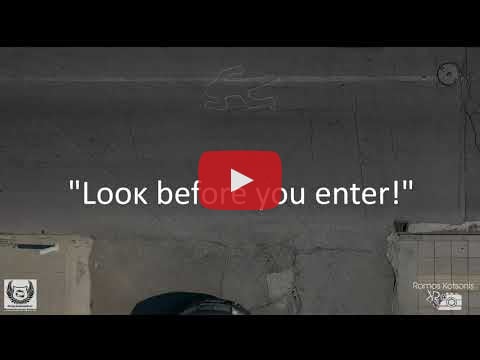
Δεν υπάρχουν σχόλια:
Δημοσίευση σχολίου